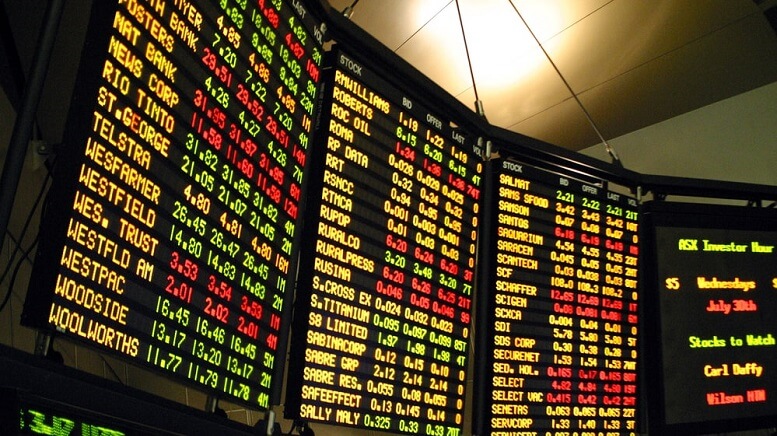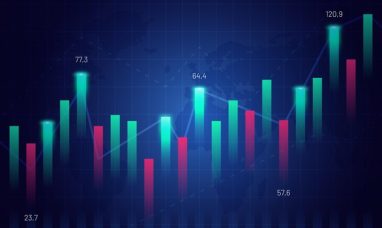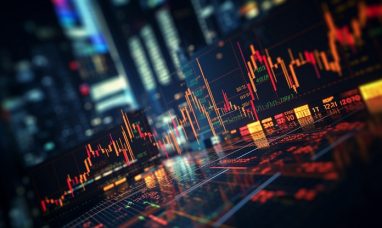After a strong three-day rally, Wall Street stumbled on Friday as trade war uncertainty once again gripped the market. U.S. stocks opened the day in mixed territory, signaling growing investor anxiety about the ripple effects of global trade tensions and unpredictable policy shifts.
The S&P 500 was up 0.2% in early trading, despite the majority of its stocks slipping. The Dow Jones Industrial Average inched down by 10 points, or less than 0.1%, while the Nasdaq Composite rose 0.3%. But beneath the surface, there was more concern than optimism.
Corporate Earnings Clouded by Trade War Uncertainty
Major companies continued to echo concerns that have become all too familiar: trade war uncertainty is making it difficult to provide reliable forecasts. Intel (NASDAQ:INTC) dropped 7.6% despite beating early-year expectations, citing “elevated uncertainty across the industry” and issuing a lackluster outlook.
Similarly, Eastman Chemical (NYSE:EMN) fell 4.3% after projecting a weaker-than-expected spring quarter. CEO Mark Costa cited a murky economic picture and unclear product demand, largely due to the wide-reaching effects of tariffs.
These announcements follow a pattern where firms are forced to reassess or even retract guidance due to fluctuating global trade policies—many of which stem from former President Donald Trump’s tariff-centered approach.
Financial Forecasts Disrupted
Skechers U.S.A. (NYSE:SKX) joined the list of companies pulling their financial forecasts. Despite reporting a record quarterly revenue of $2.41 billion, the shoe and apparel brand’s stock fell 3.4%. The reason? “Macroeconomic uncertainty stemming from global trade policies,” according to company leadership.
This trend highlights the core issue: trade war uncertainty is not just about tariffs. It’s about the instability they create, forcing companies and consumers alike to pause major decisions, delay investments, and pull back on spending.
Is Hope Fading for a Tariff Rollback?
Earlier in the week, investor sentiment improved on speculation that Trump might ease his stance on tariffs or at least temper his criticism of the Federal Reserve. These signs led to a brief market rally, as traders hoped reduced pressure might prevent a looming recession.
However, Trump’s unpredictable communication style and the inconsistent application of trade policies continue to unnerve markets. Business leaders are particularly wary of conditions that can swing dramatically within days, sometimes hours—making long-term planning nearly impossible.
Tech Stocks Offer a Silver Lining
Amid the broader unease, Alphabet (NASDAQ:GOOGL) offered some relief. The tech giant rose 3.1% after reporting a staggering 50% jump in first-quarter profit. As one of the largest companies by market cap, Alphabet’s performance helped prop up the S&P 500, keeping it from falling into negative territory.
Tech stocks, especially heavyweights like Alphabet, often play a stabilizing role during periods of market turbulence. Still, their influence can’t fully offset the damage done by declining confidence across other sectors.
Global Markets React Cautiously
Markets outside the U.S. reflected a similarly cautious mood. Japan’s Nikkei 225 gained 1.9%, but Shanghai’s Composite Index slipped by 0.1%, indicating a mixed reaction in Asia. European markets were modestly higher, buoyed by speculation that central banks may delay interest rate hikes amid economic uncertainty.
Bond Yields and Currency Movements Signal Defensive Shift
In the bond market, the yield on the 10-year Treasury fell to 4.28%, down from 4.32% the day before. This decline continues a retreat from the recent high of 4.50%, suggesting investors are moving toward safer assets as trade war uncertainty intensifies.
Meanwhile, the U.S. dollar strengthened against major currencies, rebounding from an earlier dip that had shaken currency markets. This move further signals a shift toward defensive strategies among global investors.
Conclusion: Uncertainty Looms Over Wall Street
With major corporations citing trade war uncertainty as a key concern and investors treading cautiously, Wall Street appears to be entering a phase of heightened volatility. The coming weeks may hinge on clearer signals from policymakers—and until then, the markets may remain in a holding pattern.
Featured Image – Depositphotos








